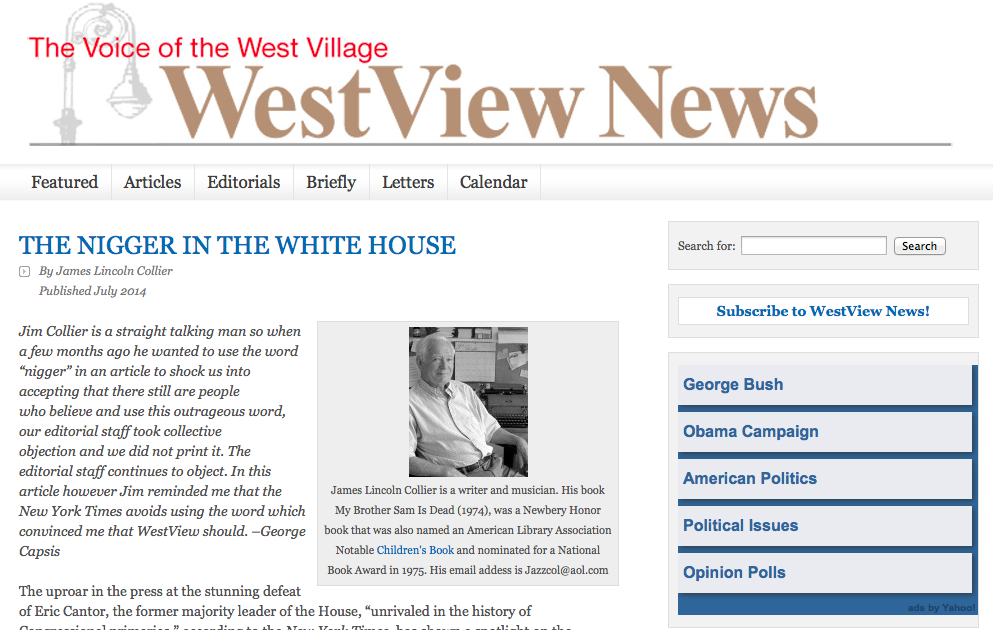The President and the “N-Word”
Put a black body where it’s not “supposed” to be, and watch people lose their minds.

The headline, as it appeared on the newspaper’s website.
Last week, The West View News, a small monthly paper with circulation in the West Village neighborhood of New York City, ran a story about President Obama with a headline that read “The Nigger in the White House.” The article, written by James Lincoln Collier, a white man, defended the president and accused the far-right of racism.
“Nigger” is a piece of language so loaded, it’s not one that anyone stumbles upon lightly, or happens to use in place of something else. It’s not synonymous with anything; it’s a word of intention. A word of consequence. A word with a lot of history attached to it.
Of course, the newspaper headline sparked debate about the use of the word, and whether its use (however ironically) has a place in journalism—or any other decent public space, for that matter. It’s an editorial decision, for sure, a move that’s the print equivalent of click-bait, which has spawned coverage and think pieces about what the word means.
There were respectability politic arguments that suggested that somehow it’s even more egregious to use the word in discussion of the president (as if his position should supplant his racial or cultural identity), then there were other arguments that suggested the word’s inconvenience:
“So why was the n-word absolutely necessary?” writes Isha Aran from Jezebel. “There is absolutely nothing shocking about the racism the n-word refers to. It’s awful, harmful, and unacceptable, but it is by no means shocking in the sense that it’s a new problem.”
There were mentions of how The New York Times “avoids” using the word, and first-person anecdotes about personal struggles with the word and racism.
With all of the swirling discussions over the headline, the prevailing attitude seems to be that the word “nigger,” a heavy word, loaded with history, is just too complicated for anyone to want to deal with. We debate the word’s necessity because its legacy makes us uncomfortable; with enough Civil Rights legislation on the books, we’ve come to accept the insidious and corrosive mindset that comes along with the word with a simple “haters gon’ hate,” because it’s apparently lost shock value.
Racism isn’t a new problem, but I’m never not in awe of it, especially in a modern context. Consider the early 20th century poem “Niggers in The White House” (or even 2011’s “Niggas In Paris”). You put a black body where it’s not “supposed” to be, and watch people lose their minds. The implications there, of course, is that blackness is under constant restriction in its range of movement, in its ascension. That it has its place, and it’s best to stay in it.
Once we start unpacking that — what that means for the quality of black life, what that means for the ways black children are socialized, what that means for a president and administration who want to make healthcare a universal option and assure women receive equal work for equal pay — there are problems that are so much bigger than the word “nigger” (or any of the more subtle and beloved codewords of racism). For as long as racism remains a malignant cancer that goes untreated, consider the word “nigger” a recurring side-effect of the disease.
Follow Maya Francis on Twitter.


